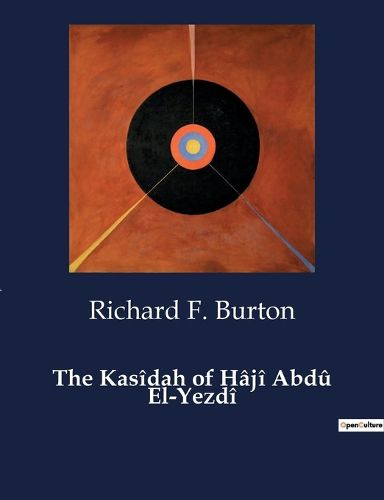Readings Newsletter
Become a Readings Member to make your shopping experience even easier.
Sign in or sign up for free!
You’re not far away from qualifying for FREE standard shipping within Australia
You’ve qualified for FREE standard shipping within Australia
The cart is loading…






This title is printed to order. This book may have been self-published. If so, we cannot guarantee the quality of the content. In the main most books will have gone through the editing process however some may not. We therefore suggest that you be aware of this before ordering this book. If in doubt check either the author or publisher’s details as we are unable to accept any returns unless they are faulty. Please contact us if you have any questions.
"The Kasidah of Haji Abdu El-Yezdi" is a long poem written by Sir Richard Francis Burton, a British explorer, linguist, and writer. The Kasidah, also known as "The Lay of the Higher Law," was written in the style of the classical Arabic qasida, a poetic form often used to express moral or philosophical themes. Key features of "The Kasidah" Philosophical and Theological Themes: Burton's poem delves into philosophical and theological themes, exploring ideas related to existence, destiny, and the nature of the divine. Pseudonymous Authorship: The poem is attributed to a fictitious author, Haji Abdu El-Yezdi, allowing Burton to present his own thoughts and reflections in a different cultural and religious context. Cultural Exploration: Burton, known for his extensive travels and studies in the Middle East, drew on his experiences and knowledge of Islamic culture and literature to compose the Kasidah. Versification: The poem is written in quatrains with a rhyming scheme, adhering to the traditional structure of the qasida. Translation and Commentary: Burton also provided translations and commentaries on the poem, offering readers insights into the cultural and linguistic aspects of the work. "The Kasidah" is considered one of Burton's significant literary contributions, showcasing his linguistic skills and his ability to engage with diverse cultural and philosophical traditions.
$9.00 standard shipping within Australia
FREE standard shipping within Australia for orders over $100.00
Express & International shipping calculated at checkout
Stock availability can be subject to change without notice. We recommend calling the shop or contacting our online team to check availability of low stock items. Please see our Shopping Online page for more details.
This title is printed to order. This book may have been self-published. If so, we cannot guarantee the quality of the content. In the main most books will have gone through the editing process however some may not. We therefore suggest that you be aware of this before ordering this book. If in doubt check either the author or publisher’s details as we are unable to accept any returns unless they are faulty. Please contact us if you have any questions.
"The Kasidah of Haji Abdu El-Yezdi" is a long poem written by Sir Richard Francis Burton, a British explorer, linguist, and writer. The Kasidah, also known as "The Lay of the Higher Law," was written in the style of the classical Arabic qasida, a poetic form often used to express moral or philosophical themes. Key features of "The Kasidah" Philosophical and Theological Themes: Burton's poem delves into philosophical and theological themes, exploring ideas related to existence, destiny, and the nature of the divine. Pseudonymous Authorship: The poem is attributed to a fictitious author, Haji Abdu El-Yezdi, allowing Burton to present his own thoughts and reflections in a different cultural and religious context. Cultural Exploration: Burton, known for his extensive travels and studies in the Middle East, drew on his experiences and knowledge of Islamic culture and literature to compose the Kasidah. Versification: The poem is written in quatrains with a rhyming scheme, adhering to the traditional structure of the qasida. Translation and Commentary: Burton also provided translations and commentaries on the poem, offering readers insights into the cultural and linguistic aspects of the work. "The Kasidah" is considered one of Burton's significant literary contributions, showcasing his linguistic skills and his ability to engage with diverse cultural and philosophical traditions.